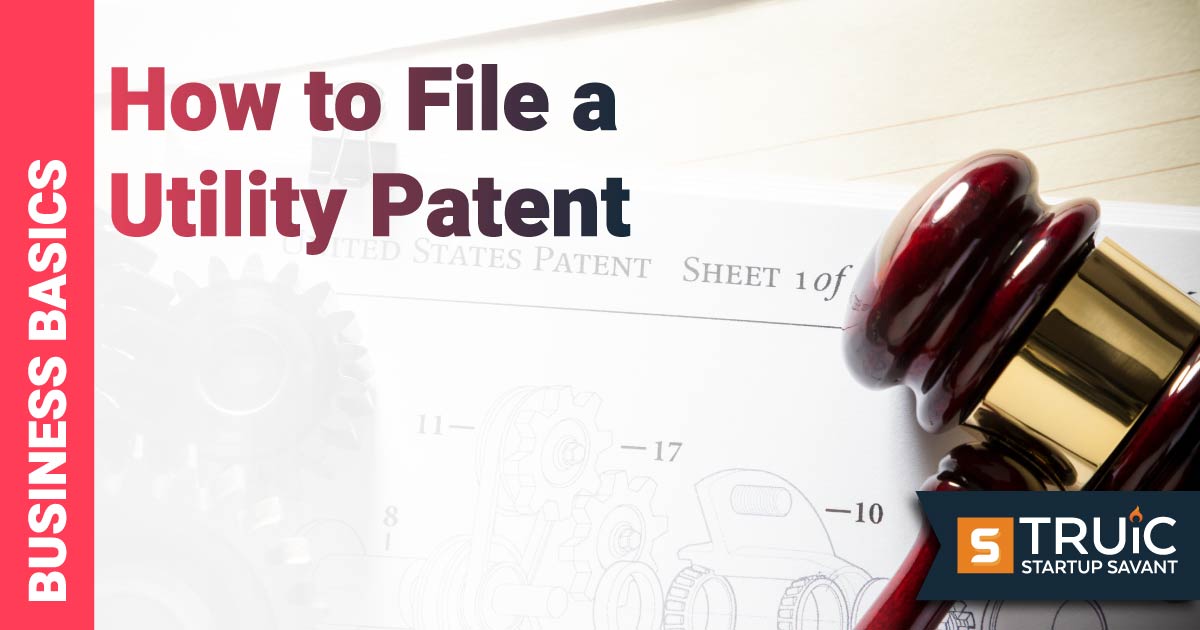How to File a Utility Patent for Your Startup

Last Updated: By TRUiC Team
When your startup comes up with a new invention or idea, whether in the form of physical products or intellectual property, it’s important to protect and safeguard your invention to ensure business success in the future.
Patents are designed to protect any process, design, or product that meets specification criteria related to its originality, suitability, utility, and practicality. For most patents that are successfully filed, your business can expect your inventions to be protected for up to 20 years.
According to the United States Patent and Trademark Office (USPTO), patents are a type of property right that gives your startup the right to prevent others from using, selling, offering to sell, making, or even importing anything within the scope of protection that your patent provides.
There are three different types of patents, including utility patents, design patents, and plant patents. Furthermore, within utility patents and plant patents are additional types of patent applications, non-provisional and provisional.
In this guide, we’re going to discuss utility patents in depth and explore how your startup can begin the process of filing a utility patent for protecting your hard work and inventions for years to come.
What Is a Utility Patent?
A utility patent is a “patent for invention” that specifically covers the creation of new or improved processes, machines, or products. When you successfully file a utility patent that’s accepted by the patent office, it protects other companies or individuals from selling, using, or making your invention with your explicit authorization.
Generally speaking, when most people refer to a “patent” in everyday conversation, they are most often referring to utility patents.
Pros
- Market ownership opportunity: When you file a patent for your startup’s inventions or intellectual property, you have the opportunity to legally own a market. This is huge, as it prevents others from competing with your invention directly and allows you to instantly capture a significant portion of the market.
- Appealing to investors: Investors who provide startup funding are often looking for companies who have patented technology that they can invest in. When a startup has gone through the process of obtaining a patent and verified their invention, it often translates to an excellent return on investment (ROI) for the investor.
- Recognition and prestige: Successfully locking in a patent is a tremendous achievement and often comes with recognition and prestige within the company or industry you represent. If your startup manages to get a utility patent for a brand new invention or piece of intellectual property, you may be rewarded with recognition.
Cons
- High costs: Intellectual property lawyers and patent attorneys can command a pretty penny, often costing over $1,000 an hour for an experienced corporate lawyer to help your startup with the patent process. While the costs may be high, they charge these rates for a reason. Navigating the patent process on your own can take up significantly more time and money than if you were to get the appropriate counsel from the beginning.
- Complex system to navigate: The patent process is far from simple and involves a number of twists and turns you must navigate through in order to come out successfully on the other side. There are certain criteria your invention will have to meet, and it’ll have to prove to be unobvious and new. On top of that, patent examiners may take many months to get back to you.
- Constant patent maintenance: When you file a patent successfully, your work is far from over. According to federal law in the United States, it is the responsibility of the patent holder (you and your startup) to protect and defend your patent by approaching any wrongdoers firsthand. It may seem like an unending process to defend and protect your patent going forward, but it is a necessity if you wish to maintain full control and market share over your invention.
When to Apply for a Utility Patent
Your startup should apply for a utility patent as soon as possible. If another party files a similar patent application before you’re able to start the process, you could lose exclusive rights to your invention or intellectual property.
Additionally, according to United States patent law, you must file the application for your patent within one year of when you first offered to sell your invention or within one year of when you first publicly disclosed or used your invention.
When to Hire a Patent Attorney
If you begin reading about the patent process and start going through the initial steps only to find yourself confused and “in over your head,” this is a clear sign that a patent attorney will be able to help you speed up the process considerably and help you avoid any mistakes or errors.
The patent process is complex, and an experienced patent attorney will help you walk through the process step by step.
How Long Do Utility Patents Last?
Utility patents that have been issued by the United States Patent and Trademark Office (USPTO) can last for an extended period of time up to 20 years. It’s important to note that you and your startup may be required to pay maintenance fees over that period of time in order to keep your patent active.
File a Utility Patent in Four Steps
If you’re ready to file a utility patent for your startup, there are several steps you can take to successfully kick the process off.
Step 1: Search for Existing Patents in the USPTO Database
One of the best ways to verify whether or not your idea is already patented and exists in the USPTO database is to use the USPTO patent search feature and look through the list of patents that currently exist. This will allow your startup to perform some initial research and verification of your potential patent.
Step 2: If You’re Inexperienced, Hire a Patent Attorney
If this is your first time going through the patent process and you’re unfamiliar with the complexities, hiring a patent attorney will ensure you avoid any unnecessary mistakes and errors.
Step 3: Determine a Filing Strategy
Next, you’ll need to determine your filing strategy. Are you filing globally or just within the United States? Does your invention or intellectual property need international protection? Will you be filing a provisional or non-provisional utility patent? These are all questions that must be answered at this stage of the process.
Step 4: Prepare for Electronic Filing and Submit Your Application
Once you've determined your strategy and ensured that everything is in place, you should determine whether you’re going to be filing the patent yourself (pro se) or using a registered attorney or registered agent (recommended). The final step is to submit your application to the USPTO and wait for application review.
FAQ
What is a patent?
A patent is an official license provided by a government authority that prevents other individuals or organizations from using, making, selling, or creating the invention or intellectual property within the scope of the patent for a set period of time.
What are the different types of patents?
There are three different types of patents, including utility patents, design patents, and plant patents. Furthermore, within utility patents and plant patents are additional types of patent applications: non-provisional and provisional.
How do I decide if I should apply for a patent?
If you have an invention that is a significant part of your startup, and you’re worried about others copying your invention or taking up market share by copying your process, you should most likely consider applying for a patent.
Can you conduct a utility patent search?
Yes, you can conduct a utility patent search, and one of the best ways to verify whether or not your idea is already patented and exists in the USPTO database is to use the USPTO’s patent search feature.
How much does a utility patent cost?
The cost of filing a utility patent may cost anywhere from $7,000 to $20,000 depending on the attorney costs for initial filing as well as maintenance fees and further protection throughout the time your patent is active.
Is a utility patent worth it?
Yes, a utility patent is well worth it if your startup company or organization relies on the invention to conduct the majority of your business and wants to keep a large share of the market.
Should I hire a patent attorney?
If you’re inexperienced and struggling with the initial steps of the patent filing process, you should hire a patent attorney to help you along with the process. They’ll be able to walk you through step by step and assist with any questions.


